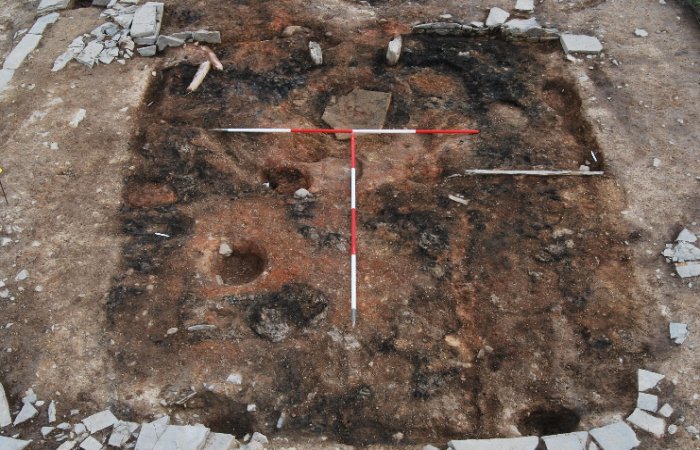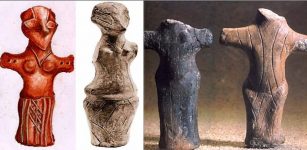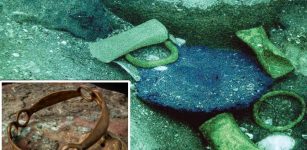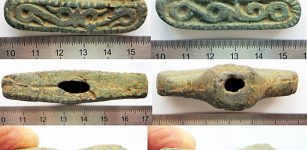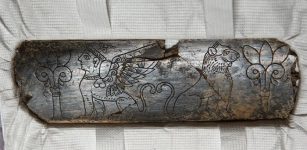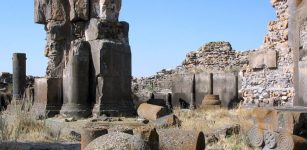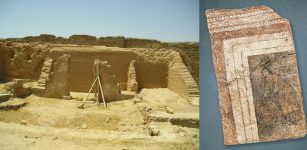Scotland’s First Farmers Didn’t Need Manure To Fertilize Their Fields – The Land Was Still Very Productive
Conny Waters - AncientPages.com - Early farming in Scotland was a less smelly affair than elsewhere, as new research shows they did not need to use manure to fertilize their fields—unlike their counterparts in other parts of the British Isles and on mainland Europe.
A house at Braes of Ha’Breck, one of the sites studied by the researchers. Credit: A. Thomas and D. Lee
The discovery was the result of an analysis of finds recovered from the site of Balbridie, in Aberdeenshire, which was discovered during excavations between 1977 and 1981. This well-preserved Neolithic site was home to some of Scotland's first farmers around 3800 BC and features a well-preserved timber hall.
A large quantity of ancient grain was also recovered from Balbridie, which a team of researchers have now studied with stable isotope analysis. A plant's growing conditions impact the ratios of its carbon and nitrogen isotopes, which researchers can analyze.
The team's research, published in the journal Antiquity, reveals that prehistoric farmers did not use manure to fertilize their fields. Nevertheless, the land was still very productive.
"The stable isotope analysis revealed very low nitrogen levels showing that the crops were not grown on manured soils," said lead author Dr. Bishop, from the University of Stavanger in Norway, adding "the large size and number of the grains recovered suggest that during this first phase of farming, the soils were productive without the need for manuring."
Conversely, previous research on early farms in England, as well as on mainland Europe, has almost always found evidence that crops were grown in manured fields. This shows that during the initial phase of farming in the Neolithic, parts of Scotland were well suited for farming.
However, not all early farmers got to avoid dung duty. The team also analyzed the contemporary site of Dubton Farm, Angus, and found manure was used there.
Indeed, manuring eventually became the norm in Scotland. Dr. Bishop and the team also analyzed later Neolithic farms on Orkney, at the sites of Skara Brae and the Braes of Ha'Breck from c. 3300-2400 BC, and found they were using manure. The team also found the Orkney farmers were using permanent plots in a wider landscape than expected.
"The evidence showed that they grew their crops in permanent fields," said Dr. Bishop. Other researchers had suggested that Neolithic farmers in Britain farmed small transient fields, frequently moving their plots to new areas of land, or that they were a semi-nomadic population, who did not grow crops every year. However, these results show this was not the case in Scotland.
Dr. Bishop added that "at one of the Orkney sites we were also able to show that these early farmers grew their crops over a range of different soils, suggesting they grew their crops quite extensively around the landscape or that different farms were storing their crops in a communal store at the site."
Such wide use of the landscape and potential pooling of resources would also have helped protect against crop failure, an ever-present threat in the harsh environment of Orkney.
Ancient farmers were able to develop varied sustainable strategies for different conditions.
"The variability of the cropping strategies identified highlights the adaptability of early farming practices," said Dr. Bishop, noting the range of farming practices they identified across Scotland. This raises the possibility further research in other regions may also reveal a similar diversity. Perhaps many early farmers were able to avoid using manure.
The team hopes such research could also help us in the present: "The potential of stable isotope analysis of cereals for recognizing past sustainable (and unsustainable) land use elsewhere across the globe may provide lessons for managing future human impacts on the environment," said Dr. Bishop.
Study in Antiquity
Written by Conny Waters - AncientPages.com Staff Writer

